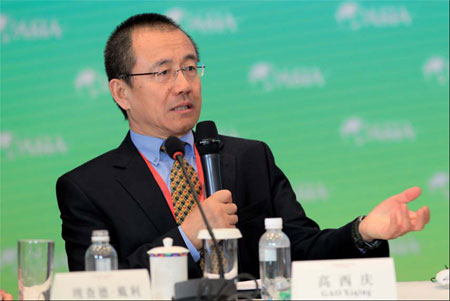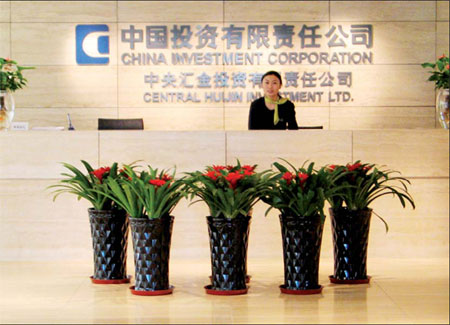Wealth factor
Updated: 2013-09-27 09:40
By Chen Jia (China Daily)
|
|||||||||||
China's sovereign wealth fund banks on diversified investment approach for assured returns
At first glance, the nondescript building in downtown Beijing does not even merit a second look. But very few know that behind the glass facade is the office of China Investment Corp, the country's sovereign wealth fund that has $575 billion (427 billion euros) in assets and invests predominantly in overseas markets.
There is no sign of wealth or rich trappings, and the sparsely furnished walls, or the corner office of the chairman and the spartan furniture that dot the premises give the distinct feel and flavor of an ordinary government office in China. On any given day it is common to see groups of people dressed in suits huddled over piles of balance sheets and maps of Europe and Africa holding forth on the state of the economy, investment options and pricing strategies. Within these walls lie the rich talent pool or the real wealth that is helping CIC achieve stable, assured returns through its diverse investment mix.
Ding Xuedong, the new chairman of the sovereign wealth fund, had recently remarked that these are indeed tumultuous times for the global financial markets, as there are several uncertainties. While most of the sovereign wealth funds such as Temasek of Singapore and the Government Pension Fund of Norway still prefer asset-backed investments, CIC goes for a more pragmatic approach and diverse investment portfolio.
According to fund officials, CIC's main objective is to make more money from its overseas investments and generate additional capital for investment.
Adjustment of the investment portfolio and the higher equity prices saw the fund post robust returns last year, especially from the long-term assets in global markets. CIC posted a 10.6 percent gain on its global investments last year, compared with a 4.3 percent loss in 2011, according to the company's annual report. The cumulative annualized return of CIC's overseas investments rose to 5.02 percent by the end of last year, from 3.8 percent in 2011. Net income rose to $77.4 billion from $48.4 billion in 2011, the report said.
Fund officials say that such a good performance has been possible due to the fund's diverse approach. "It enabled us to adjust our investment portfolios in line with the higher equity prices in global markets last year," a CIC official says.
During the same period, Temasek of Singapore achieved returns of 1.5 percent, while the Norway fund came in with 13.4 percent. Other wealth funds such as Singapore's GIC and the Abu Dhabi Investment Authority are yet to publish their earnings numbers.
"When you look at these numbers, you can see that 10.6 percent is a good return on investment for a sovereign wealth fund," says Victoria Barbary, director of Sovereign Wealth Center, a London-based market intelligence company.
Meanwhile, at the fund offices in Beijing, it is work as usual. CIC knows that it cannot afford to rest on its laurels. "The fixed-asset strategy boomeranged in 2010 after our Morgan Stanley equity investments sharply eroded in value," the unnamed fund official says.
"Our losses were in the region of $115 million. We also faced a lot of umbrage for staying invested in overweight US Treasury bonds. It was then that the fund decided to broaden its investment portfolio from financial products to infrastructure and industrial projects, and also from North America to Europe and other emerging markets in Asia and Africa."
Barbary says CIC's shift toward an endowment model is also an indication that the fund is not too sure of receiving future funding from the People's Bank of China, the central bank. Since the fund's launch, the State Administration of Foreign Exchange, which manages the country's $3.5 trillion foreign exchange reserves, has given it only an additional $49 billion to invest abroad. With further capital injections uncertain, CIC is increasing its exposure to assets that yield fairly predictable short and long-term cash flow for reinvestment, she says.
New frontiers
Since its inception in 2007, CIC has strived to generate higher returns on China's huge foreign exchange reserves. Most of its investments have been spread across a range of countries such as Australia, Brazil, France, Russia and the United Kingdom.
Last year, nearly 27.8 percent of the equity investments CIC made overseas were in advanced economies other than the US, with Europe being the mainstay. The corresponding figure for such investment in 2011 was 20.6 percent.
A look at the direct investment projects of CIC last year shows that five out of the six projects were in Europe, including France, Russia and the UK. In 2012, 23 percent of CIC's equity purchases came from the emerging markets, especially in the Asia-Pacific region. The proportion was 29.6 percent in 2011. But that seems to be changing, as Africa and Europe are slowly becoming new destinations for the fund.
In November last year, CIC invested 450 million pounds ($720 million; 535 million euros) for a 10-percent stake in Heathrow Airport Holdings Ltd, a prominent airport operator in the UK and one of the busiest international air hubs in Europe.
It also invested 276 million pounds in January last year for an 8.68 percent stake in Thames Water Utilities Ltd, a London-based private utility company responsible for public water supply and waste water treatment.
"CIC perceives UK as a destination of choice for long-term investment because of its business-friendly environment and sound legal framework," the company's annual report said.
Russia is another region in Europe where the fund has invested in several resource projects. Last year, the CIC signed a memorandum of understanding with Vnesheconombank in Moscow for investment cooperation in infrastructure construction and development programs in the Russian Far East. The fund also injected $425 million into Polyus Gold International Ltd, the largest gold producer in Russia.
CIC is also planning to expand its investments into West and East Africa.
"The fund is in talks with government officials from countries in these areas for railway, port and highway investment projects, especially for the cross-border highways," Gao Xiqing, CIC"s vice-chairman and general manager, said in March.
Analysts feel the signals exhibited by the sovereign wealth fund in recent years shows it is keener on energy resources and fixed-asset investment projects overseas, besides buying financial products, such as treasury bonds and shares. On the other hand, it has also spurred criticism that Chinese investment could be a potential threat to local development.
However, CIC officials dismiss such charges. "CIC has always identified itself as a 'pure' financial investor," the unnamed fund official says. "Although it is the biggest manager of the country's foreign exchange reserves, it is more of a strategic investor."
Wu Weihai, a researcher at the research institute under the Ministry of Industry and Information Technology, says wealth funds usually base their global investments on two factors. While the first approach focuses on buying equity in companies and industries to gain dividend and stock premium, the other is concentrated on rights purchases in select companies to gain management control. "It is obvious that CIC investment strategy falls into the first category," Wu says.
The next step for CIC should be to invest in overseas industries that have advanced technologies or management capabilities, as it would help accelerate domestic industrial upgrade and facilitate economic rebalancing, Wu says.
"The company's goal is pursuing long-term returns by customizing investment strategies based on different projects in different countries," CIC vice-chairman Gao says. "The investment theme is not for mergers and acquisitions, or to control any overseas company, and we don't want to be seen as a destroyer by any country."
According to the company's 2012 annual report, by the end of last year, the company's total assets stood at $575 billion, compared with $482 billion a year earlier. About 32 percent of its overseas investment were in public equities, 32.4 percent in long-term investments and 19.l percent in fixed-income securities.
"We have increased purchases of public equities and steadily boosted long-term investment in infrastructure construction, energy and mineral resources, and real estate," the unnamed official says.
Different role
Last year was the fifth anniversary of its establishment and at that time the fund's board of directors reviewed and approved its 2012-16 Strategic Plan of Development, which outlines the guidelines for CIC's overseas investment. During the meeting, the directors decided to extend the investment horizon to 10 years and adopted rolling annualized returns as an important benchmark to evaluate the performance.
Ding, the current chairman and former deputy secretary-general of the State Council, says that CIC zeroed in on the endowment model of asset allocation after looking at several such models in the past five years.
"We have developed the policy portfolio to better align and balance our strategic and tactical asset allocation, and to improve portfolio integrity, boost fiscal discipline and for prudent management."
In 2011 the company suffered a loss of 4.3 percent on its overseas investment projects, compared with a profit of 11.7 percent in 2010, raising serious doubts over its investment measures and risk control system.
A research note from Zero Power Intelligence Co Ltd, a Chinese market research firm, indicates that CIC's returns are directly related to the performance of the global financial market. The loss in public equities and direct investment projects was the main reason for CIC's negative return in 2011, when the MSCI World Index dropped 7.4 percent, the research note said.
The sovereign wealth fund was launched five years ago with registered capital of $200 billion. Of this, $90 billion was transferred to domestic financial institutions through CIC's wholly owned subsidiary Central Huijin Investments, and the balance $110 billion went for overseas investment. Last year, the State Council injected another $19 billion into the sovereign wealth fund after raising $30 billion in 2011.
Liu Shangxi, deputy director of the Research Institute for Fiscal Science under the Ministry of Finance, says that unlike other sovereign wealth funds, the State Council has clearly specified the duties and functions of CIC.
"The main task of CIC is to manage the foreign exchange given by the central government and use it on behalf of the state to invest in overseas markets," Liu says.
About 49.2 percent of equity purchases overseas have been from the US markets, compared with 27.8 percent in other advanced economies and 23 percent in emerging markets, the CIC annual report said. In addition CIC has invested 22.3 percent of its fund in the overseas financial sector, while 11.6 percent is in the information technology sector and 10.7 percent in the consumer discretionary industry, it said.
Guo Tianyong, a professor at the Beijing-based Central University of Finance and Economics, says CIC must maintain "long-term investment" and diversify risks for long-term gains. "The fund should also stress talent retention and cultivation as that will help sound growth of foreign exchange reserves," Guo says.
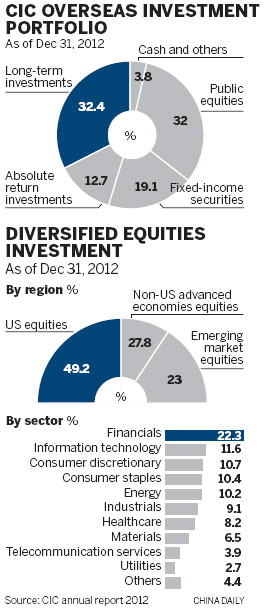
Though there have been some reports that the Chinese central bank and the State Administration of Foreign Exchange are planning to create a new institution for using the foreign exchange reserves for investments, neither the central bank nor CIC has given any such indications, experts say.
In January, the SAFE launched a special office to invest foreign exchange reserves overseas in terms of entrusted loans. Most of the borrowers of such loans are enterprises that are planning overseas expansion.
"CIC faces competition from the SAFE, which is also investing in equities, private equity, real estate and infrastructure to diversify China's foreign exchange reserves," says Barbary of Sovereign Wealth in London.
"Ideally, there wouldn't be two different funds attempting to fulfill the same role, and an ongoing funding stream would be designated to the single fund. In that way, China might develop a fund like the Government of Singapore Investment Corp. However, given the circumstances, an endowment model is a good option for CIC."
By the end of last year, China's total foreign exchange reserves stood at $3.31 trillion, of which about 60 to 70 percent were dollar assets. According to the US Treasury Department, China's holdings of US Treasury bonds increased by $25.2 billion in May to a record high of $1.315 trillion. They rose by $151.9 billion from a year earlier.
Xu Hongcai, a senior financial researcher at the China Center for International Economic Exchange, a government think tank, says it is imperative for CIC to diversify its investments in US Treasury bonds.
"A better choice is to invest in overseas infrastructure projects and support overseas moves of Chinese enterprises."
With the US likely to gradually taper the quantitative easing policy, Xu says the sovereign wealth fund should sell some foreign equities to cash in on the returns.
"Once the developed countries start to reduce asset purchases, capital may flow out of China and other emerging markets. So CIC should foresee the potential risks," Xu says.
CIC chairman Ding says there are chances of increased volatility in world markets as major developed economies plan to reduce their quantitative easing programs, thereby posing challenges for institutional investors.
"The subdued global economic recovery, compounded by rising investment protectionism, will cast a prolonged shadow over the outlook for global financial markets," Ding says, adding that CIC will diversify its foreign exchange funds, increase investment in public equities and look for long-term investment targets with stable returns.
"I have every confidence that the solid groundwork laid during the first five years will see CIC through the next five and beyond. We have weathered the difficult times, but we must equip ourselves to embrace new challenges as we go forward," Ding says.
As CIC's domestic investment arm, Central Huijin Investment Ltd holds the Chinese government's stakes in major commercial banks, securities companies, insurance firms and other institutions. It owns a 67.72-percent equity stake in Bank of China, 57.21 percent in China Construction Bank and 47.63 percent in China Development Bank.
Liu Fanyu, managing director of the Department of Public Relations and International Cooperation at CIC, says the company is in touch with several private firms such as e-commerce company Alibaba Group, which is contemplating a public listing. However, the fund did not indicate whether it was in talks with more companies, who they were and the exact nature of talks.
However, some experts feel that to better balance risks, the fund should scale up in the domestic markets also. "It diversifies the portfolio and spreads the risks," they says.
chenjia1@chinadaily.com.cn
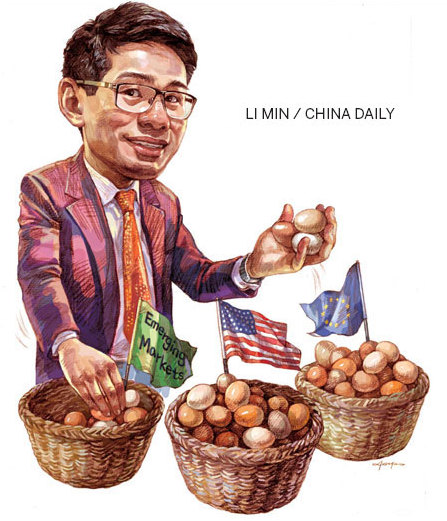
|
Above: Gao Xiqing, CIC's vice-chairman, says the fund is interested in long-term returns, not in controlling overseas companies. Below: Ding Xuedong, the chairman, faces a tough challenge in devising investment strategies, experts say. Photos Provided to China Daily |
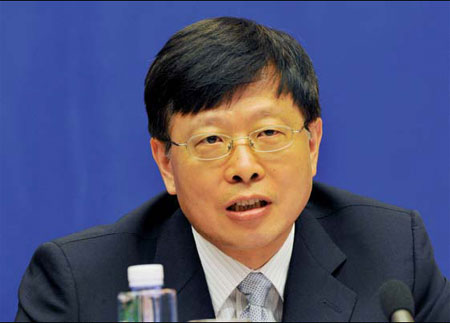
|
The headquarters of China Investment Corp. The country's sovereign wealth fund reported a 10.6 percent gain on its global investment for 2012. Wu Changqing / for China Daily |
(China Daily European Weekly 09/27/2013 page1)
Today's Top News
Website launched to assist expat professionals
50 foreign experts honored with Friendship Awards
Up, up, Huawei finds new friends in Europe nations
Visible face of CIC investment
Shanghai opens free trade zone
Academic warns Obama on Pacific policy
Little-known now, but a big future
NSA mapping social networks of US citizens
Hot Topics
Lunar probe , China growth forecasts, Emission rules get tougher, China seen through 'colored lens', International board,
Editor's Picks

|

|

|

|

|

|
